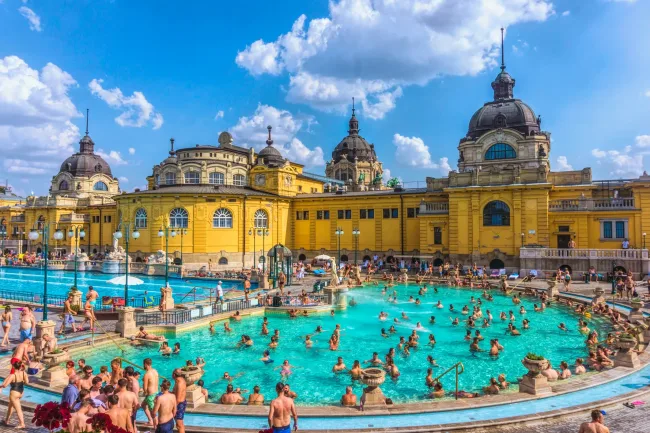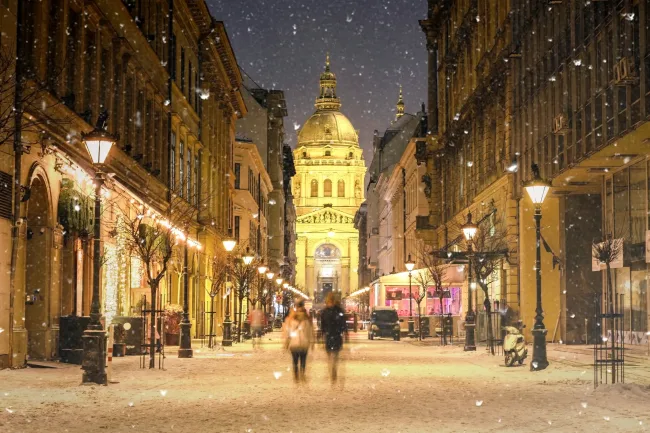
Welcome to Hungary
Home to multiple UNESCO World Heritage Sites such as Central Europe's largest lake, Lake Balaton, and Europe's most extensive grassland, Hortobágy, amongst others; and adorned by its charming capital, Budapest, well known to be one of the most beautiful cities in the world, Hungary is fairly one of the most visited destinations in Europe.
In this ultimate Hungary travel guide, we provide you with some information and travel advice to make your planning easier and more enjoyable when visiting Hungary.
Document checklist for Hungary
-
Visa
-
Health Declaration
-
Valid passport (six months validity is recommended; three months validity beyond the planned departure date from the Schengen area is required).
-
Sufficient funds
-
Return airline ticket
Essential Hungary travel information
-
Currency - Hungarian Forint (Ft). $1 is equivalent to approx. 394.49 Ft.
-
Daily budget for 1 person - Allow a daily budget of 24.259 Ft. ($62).
-
Languages - The official spoken language is Hungarian. Only 20% of the population can speak English to some degree, mainly in Budapest.
-
Socket type - Types C and F. Hungary operates on a 230V supply voltage and 50Hz.
-
Time zone - Central European Standard Time (GMT+1).
-
Top 3 cities to visit - Budapest, Eger, and Pécs.
-
Top 3 landmarks/monuments - Egerszalók Sódomb Thermal Spring, River Danube, and Lake Balaton.
Visa information for Hungary
Traveling to Hungary is relatively easy as it belongs to the Schengen Zone, which means that most foreigners (including nationals from the United States) who are visiting Hungary for tourism, cultural or sports events, and to attend business meetings are allowed to do so for up to 90 days within a 180-day, visa-free period.
However, a Schengen Visa is necessary for some foreign nationals.
Also, keep in mind that as of May 2023, Hungary's entry requirements will change due to the introduction of the ETIAS (European Travel Information and Authorization System).
Schengen Visa
The Schengen Visa is a tourist type of visa required for travelers from different countries to be allowed to move across the Schengen Zone, which comprises 26 states of the European Union. Nationals from any Schengen Zone country don't need a Schengen visa to transit in the territory.
The Category C Schengen Visa is a basic tourist visa that allows its holder a 90-day stay for tourism, personal visits, and work-study programs.
Find all the information related to the Schengen Visa for Hungary and the application process here.
Hungary ETIAS
The ETIAS is a digital travel authorization that, as of May 2023, will be part of the travel documents required for all foreign nationals visiting any of the countries within the Schengen Zone and who don't need a visa to enter the territory. It is valid for up to three years or until the holder's passport expires.
To obtain the [Hungary ETIAS], it is necessary to apply via a short online form by providing your personal information and the name of the first Schengen Zone country you will visit. Once your application is approved, you will receive the ETIAS via email. We highly suggest saving a hard copy and a digital copy of the document to submit with your passport and travel documents at the airport.
Typical costs and budget for Hungary
The following is a basic guide to what you could spend on a daily basis on an average budget.
Daily spending per person - Around 24.259 Ft ($62) per day per person on a budget vacation, which includes:
-
Meals - 6.425 Ft ($16)
-
Transport - 3.450 Ft ($8.74)
-
Hotel - 12.122 Ft ($30.70) - 1 person
The budget for vacation for one week is around 169.810 Ft ($430) for one person.
Transport and ways to travel around Hungary
In Hungary, you will find a very efficient and affordable transportation system that combines domestic trains, commuter trains, trams, buses, and the metro. Monthly passes for frequent commuters cover all means of public transportation. They can be obtained at all main Metro ticket stations. There is also a Student Pass for students and a Youth Fare for people under 26, so if you belong to either of these two groups of people (or both), make sure you ask for it. For getting more information about the transport system and buying tickets, please visit https://bkk.hu/en/tickets-and-passes/.
The heart of Hungarian railway transport is in the capital, Budapest, and it is actually quite a comfortable means of transportation. The three main railway stations in Budapest offer cloakroom services, and departures and arrivals can be checked in printed and digital timetables at the stations. It is advisable to buy food and drinks at the stations since most trains don't offer food service. You might want to know about the different types of trains:
-
Intercity - the fastest and most comfortable trains which stop only at the main stations.
-
Express - it is a bit slower but also cheaper than the Intercity and serves more stops.
-
Passenger trains - stop at all stations.
For purchasing tickets for domestic trains, you can visit HTTPS://WWW.MAVCSOPORT.HU/EN
Safety in Hungary
Hungary is overall a safe country, but it has a low petty crime rate, mostly in Budapest. Here we provide you with some general safety advice:
-
Crowded places may attract pickpockets, so behold of your belongings.
-
When calling a taxi, always use reliable and well-known taxi companies or apps.
-
When clubbing, pay attention to your drinks and avoid accepting food or drinks from strangers since drink spiking can happen.
-
When traveling by train overnight, lock your cabin and don't leave your luggage unattended.
-
The security situation regarding the Russian invasion of Ukraine is volatile, so avoid traveling from Hungary to Ukraine.
Weather in Hungary
Hungary's weather is determined by the four seasons, which are very variable, since the territory is located in a temperate zone surrounded by the Alps and the Carpathian mountains. Average temperatures range from -4 °C in Winter to 26 °C in Summer.
Popular cities and towns in Hungary
You can do plenty of activities around Hungarian cities, from the charming capital Budapest divided by the Danube to strolling across valleys, mountains, and rivers in Eger and Gyor and, why not, to wine tasting in the Pécs region.
-
Budapest - crossed by the Danube River, on one side the classy Buda, and the touristy Pest on the other. Definitely a must-see!
-
Eger - stroll across Szépasszony Valley, taste Eger wine, and plunge into a 400-year-old Turkish Bath.
-
Pécs - wine tasting and the country's sunniest region.
-
Debrecen - an easily accessible travel destination thanks to its International Airport.
-
Gyor - the city of rivers in the country's northwestern region.
Must do and see in Hungary
-
Budapest Sight-seeing - Hungarian Parliament Building, Heroes' Square, Fisherman's Bastion in Buda Castle, Citadella, and the Chain Bridge.
-
Castles and Palaces - Boldogko Castle, Fuzer Castle, Esterházy Castle, Buda Castle, and Vajdahunyad Castle.
-
Baths - Széchenyi Thermal Bath, Hévíz Lake Bath, and Cave Bath in Miskolctapolca.
-
Káli Basin - Salt hill of Egerszalók and the library of the Cistercian Abbey of Zirc, both unique pieces.
-
National Gallery Museum - home to the largest collection of fine arts.
Typical Hungarian food to try
-
Goulash - delicious soup with beef and vegetables
-
Csirkepaprikás - a signature stew made from slow-cooked chicken or beef and paprika
-
Túrós Csusza - locals' favorite pasta prepared with bacon and curd cheese.
Vaccine information for Hungary
Before traveling, it is important to know what routine vaccines and COVID-19 measures are required to enter Hungary and any other European Union country. We recommend you check out the CDC website to find out about all entry rules regarding vaccine requirements and any recommended guidance or medicine lists.
Hungary, a landlocked country
Hungary is located in Central Europe in the Carpathian Basin. It is a landlocked country, meaning it is fully surrounded by land with no sea exits, specifically sharing borders with 7 different countries: Austria, Slovakia, Ukraine, Romania, Serbia, Croatia, and Slovenia. Two main and longest rivers, the Danube and Tisza, divide the country into three: the Trans-Tisza on the east, the Transdanubia on the west, and the Plain between the two rivers.
Fun facts about Hungary
Here are some fun but also useful facts about Hungary. Did you know that…?
-
Hungary has 10 national parks spread all around the country. They are home to a wide variety of flora, fauna and diverse ecosystems.
-
Hungary has more than 2,000 plant species, most of which are not normally found at this latitude.
-
In spite of its relatively small size, Hungary hosts multiple UNESCO World Heritage Sites, such as the thermal lake, Lake Hévíz, Lake Balaton, and the Natural Grassland Hortobágy.
-
Budapest, Hungary's capital, is regarded as one of the most beautiful cities in the world.
-
Hungary is one of the very oldest countries in Europe. Founded in 895, it is older than Germany and France.

 India Visa
India Visa
 Turkey Visa
Turkey Visa
 United States Visa
United States Visa
 Australia Visa
Australia Visa
 Colombia Visa
Colombia Visa
 New Zealand Visa
New Zealand Visa
 China Visa
China Visa
 Egypt Visa
Egypt Visa
 Vietnam Visa
Vietnam Visa
 Indonesia Visa
Indonesia Visa

